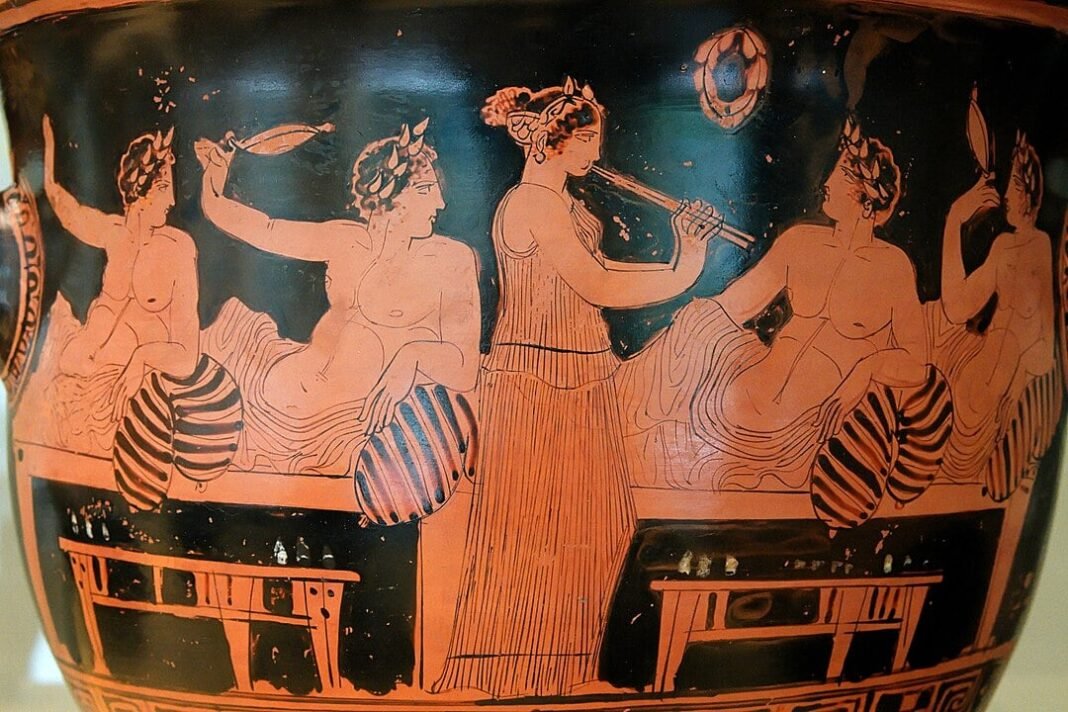
Friendship might not be the first thing we associate with ancient Greeks, but their philosophical reflections on it are worth remembering.
The ancient Greeks believed friendship was far more serious than a few hours of chatting and banter with your best friends. They treated friendship as a comprehensive philosophical system that shaped their entire society. It is not an exaggeration to say that ancient Athens was home to the world’s first think tank on human relationships.
While most of us struggle to maintain a handful of meaningful friendships in our fast-paced, interconnected world, ancient Greek philosophers such as Aristotle, Plato, and Epicurus were writing entire works dedicated to the subject.
They distinguished various types of friendship with different terms, formed communities centered on companionship, and truly believed that life without close friends was not worth living.

The ancient Greeks and Aristotle’s beliefs on friendship
Aristotle, one of the world’s most recognizable ancient philosophers, spent considerable time thinking about friendship and its role in the societies of ancient Greece. His Nicomachean Ethics could even be seen as a manual on friendship.
The philosopher divided friendships into three categories. First, there are friendships of utility. Examples include business acquaintances, professional networking, or similar practical relationships. Aristotle wasn’t being cynical about these; he simply recognized them for what they were: temporary, practical, and necessary for many aspects of daily life. He described these relationships as friendly because both parties need something from each other.
The second type of friendship is based on pleasure. These are your drinking buddies, tennis partners, or people you enjoy spending time with—not because you have to or expect anything in return but simply because it’s enjoyable. Aristotle noted that these friendships were particularly common among young people, which makes sense. When you’re a teenager or young adult, you’re not usually seeking deep philosophical conversations over morning coffee; you want fun, and friendships at that age are centered on enjoyment and adventure.
But the highest form of friendship, according to Aristotle, is the one based on virtue. These rare relationships exist between people who genuinely admire each other’s character and want the best for each other without expecting anything in return. It’s the friend who tells you when you’re being an idiot, celebrates your successes without jealousy, and sticks around when life gets messy. Sounds rare? That was the case in ancient Greece, too.
What’s particularly interesting is that contemporary research continues to support Aristotle’s ideas. Psychologists studying long-term relationship satisfaction find that couples and friends who share core values and mutual respect tend to cope far better than those whose bonds are based purely on convenience or shared hobbies.

Epicurus and the garden experiment
If Aristotle was the theorist who distinguished different types of friendship, Epicurus was the practitioner—the philosopher who put theory to the test.
Epicurus did something radical for 4th-century BC Athens: he created an integrated community where women, slaves, and people of various social classes actually lived together and sought to understand life and its meaning.
He established his Garden in 307 BC, and it was unlike earlier philosophical schools. It functioned as a laboratory of friendship, where people could put theory into practice. For Epicurus, friendship was central to human well-being. The philosopher genuinely believed that proper friendship could solve many of humanity’s problems.
He once said, “Friendship dances around the world, announcing to each of us that we must awaken to happiness” (Greek: ἡ φιλία περιχορεύει τὴν οἰκουμένην κηρύττουσα δὴ πᾶσιν ἡμῖν ἐγείρεσθαι ἐπὶ τὸν μακαρισμόν), a statement that sounds poetic until you realize its profound significance. His followers established Epicurean communities throughout the Mediterranean, creating networks of mutual support that lasted centuries, promoting the deeper meaning of human connection—bonds only found in true friendship.
What made Epicurus’ interpretation of friendship revolutionary was its egalitarian nature. Ancient Greece was a society with deeply-rooted hierarchies and social status. However, Epicurus argued that character mattered more than birth circumstances. His Garden in Athens operated more like a chosen family than a traditional Greek household, with people caring for each other’s physical and emotional well-being.
Modern intentional communities owe a debt to Epicurus. Kibbutzim, famous Israeli co-housing projects, and even some contemporary LGBTQ+ chosen family structures draw inspiration from these Epicurean principles of friendship—the idea that meaningful bonds can be based on shared values rather than blood or social convenience.
These examples show that the Greeks understood something many of us have forgotten. They recognized that various relationships serve different purposes. We don’t need to expect work colleagues to be our emotional support system, nor should we feel guilty about enjoying superficial friendships that are just that—superficial. Simply realizing this could save people a great deal of unnecessary drama.
Additionally, the ancient Greeks knew that without at least a few deep, character-based relationships, life becomes difficult. Modern loneliness epidemics, despite our unprecedented connectivity, suggest they were right. Social media provides many utility- and pleasure-based connections, but virtue-based friendships are increasingly rare. The reason is simple: these friendships still require the same investment of time and emotional energy they always have, resources that many lack today.
Contemporary psychology confirms what Aristotle observed 2,500 years ago. Research on social support consistently shows that people with strong, character-based relationships live longer, happier lives, and even recover from illness faster.
Even our political landscape could benefit from ancient Greek ideas on friendship. Aristotle argued that friendships among citizens strengthen a democracy—a concept that seems almost idealistic in an age of extreme polarization. Similarly, Epicurus demonstrated how genuine community in action can challenge power structures that create artificial boundaries between people.


